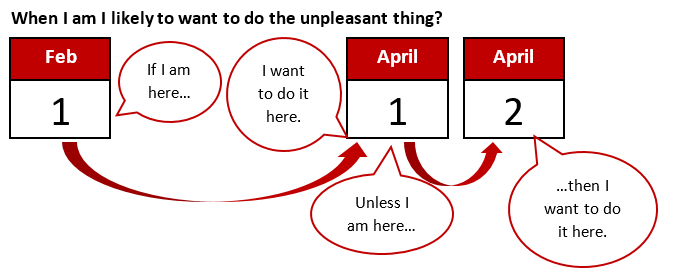Instant gratification: Fighting the immediacy of now

We have an unprecedented ability to satisfy our need for instant gratification. We are building a wave of technological advances which have a sole purpose of feeding the immediacy of now. We are consumers, and we are creating new ways to give us what we want, when we want it.
Consider some recent examples…
Movies

It was only a few decades ago that the only way to watch a movie at home was to wait for it to come on TV. Jump forward past VHS and DVD and you can now stream almost any movie at any time for less than $10 per month. Netflix binge watching is a new phenomenon, contributing to over 62 million subscribers who stream an average of 2 hours of entertainment per day. That comes out to a full month per year for a single person. Collectively each year, there are over 199 human lifetimes spent (average lifetime of 71 years) watching movies and TV shows on Netflix.
Music

The music trade business used to be cassette tapes and LPs in record stores. The 70’s version of the Pirate Bay was the trunk of a car. MP3s allowed that trade to go online, and now services like Spotify and Pandora allow you to listen to any song as soon as it comes to mind. In 2014, Spotify streamed over 7 billion hours of music.
Video games

Standing in lines at arcades to play the latest video game is largely a thing of the past. Game cartridges and CDs were a transition to immediate delivery to smart phones or through streaming services such as Steam, Xbox Live and the appropriately-named-for-instant-gratification Playstation Now. Digital game sales have outpaced physical discs since 2013, and digital delivery of games supports an overall 4% video game industry growth, even as physical software sales dropped by 34%.
Retail purchasing


The key messages in the advertisements above epitomise our move to convenience and immediacy through online shopping. Retail therapy previously involved heading down to the local shopping malls. That cultural and community shopping icon is diminishing, with over half of malls in America predicted to close in the next 15 years. No longer do we need to bother getting in the car, or even out of our pyjamas. The e-commerce industry appears to be in perpetual growth. Pillars of online sales such as Amazon are having to invest in even faster delivery methods to satisfy our gratification and stay ahead of their competition.
Fast food

We have moved far from the 1950’s drive-through window, a concept that embodies instant gratification. Now, rather than driving through their window, the rise of fast food home delivery has restaurants driving through our window. The process of ordering is becoming more instant. In Australia for example, over 80% of sales of Domino’s Pizza are expected to be through digital channels by 2017. If the process of ordering takes too much time, you can now even order a pizza with a single Twitter tweet.
News


I saw the image above by a local paper offering to feed our need for news on any channel at any time. Physical newspapers have seen a steady 8% decline, leading some to stand a “newspaper death watch” while others such as award-winning Chicago economist Matthew Gentzkow say the Internet is not solely to blame. Choice can be overwhelming, and smart providers of news know that the key is to own whatever channel that will get the consumer hooked into a habit. As one research paper on news consumption found:
“When confronted by a myriad of media choices, the consumer lapses into habitual patterns of media consumption in order to conserve mental resources, rather than repeatedly engaging in active selection.”
Sex

Gratification and pornography have gone hand in hand throughout history. The internet has now made that gratification both instant and anonymous. A popular statistic bandied around is that over 30% of the Internet is used for pornography. Some associate pornography with lower rates of marriage or even smaller brains, although both cases raise the question of correlation as to whether pornography is the cause or the result of the situation (do unmarried people with small brains look at porn, or does porn cause you to be single and your brain to shrink?) Either way, we have firmly established the means for an immediate substitute for one our most innate urges.
Community

A review of our increased shift to instant gratification would not be complete without mentioning the likes of Facebook, Snapchat, Twitter, or other platforms that offer a form of instant community. There are generations of people that may be unable to comprehend needing to be physically present to interact with many people at the same time. A like, post, retweet or favourite provides an instantaneous sense of connection.
Our quick-fix community is changing us in unprecedented ways. A recent research project shows that both collective self-esteem and communication apprehension are found to be predictors of more frequent Facebook use. Social streams offer an easy fix when physical connection becomes too hard, but it may be coming with a hidden cost.
The risks of instant gratification
Each of the examples above taken individually may seem like an innovation, an opportunity to bring efficiencies to routine tasks (not that sex would be considered routine). Viewed collectively, however, another perspective is that there appears to be a trend to feed an insatiable hunger for instant gratification, giving us what we want, when we want it.
Research shows that this is not a good thing.
The benefits of deferred gratification were popularised in Walter Mischel’s Stanford Marshmallow experiments in the 1970s, outlined in the video above. The experiment tested the extent to which a person could resist the temptation to immediate gratification in lieu of a future, more valuable reward.
The study followed the children over time. The researchers found that those children who were able to wait and exhibited high deferred gratification scored higher on university entrance scores, were more likely to finish college, and also earned comparatively higher income as opposed to those who gave in to the temptation and chose immediate gratification.
The participants in the study were children. You would expect a degree of immaturity in their ability for self-control. Yet the behaviour is similar to what we see as adults who choose physical and digital stimulation just as the children chose fluffy, sugar-candy.
Our tendency for instant gratification is ingrained. Advances in neuroscience and the ability to observe brain patterns allow us to see how repeated patterns of behaviour short-circuit paths in our thinking. Taken to the extreme, research shows that consistently favouring immediate small rewards over delayed larger ones correlates with psychiatric conditions such as attention deficit hyperactivity disorder and addictive behaviour.
As a society, we exploit our own weakness. Media advertising engines incentivise our attraction to immediacy in return for revenue. Commercial monthly sales targets are only met when consumers consume, whether or not those consumers are hungry or have a need. Financial institutions provide easy access to money that allows for immediate gratification for expensive long-term interest costs. Previously mentioned technologies continue to remove barriers to accessing whatever distraction we desire.
It appears as though our internal brains and external messages are against us. Yet we know we are not at the whim of our every inclination. Why are some people able to resist the incessant gratification drive?
Visioning and Habitual Self-control
In pursuit of an answer, I pulled up a few research papers related to the topic of instant gratification. Two trends appear for strategies to help us overcome our drive for instant gratification:
Strategy one: Visualise a future state

One key factor in overcoming the impulse for instant gratification is to have a strong visualisation, or vision, of a positive future state. The clearer you picture where you are going and your role in getting there, the less likely you will be to get distracted by a need for instant gratification.
A strong vision counters a condition called delay discounting, where the value we place on something diminishes the further in the future or the past it is as compared to the present moment. One paper titled The Economics of Immediate Gratification gives the following example:

“Suppose a person must choose between doing 5 hours of an unpleasant task on 1 February versus 5 hours on 1 April. Most people would choose 1 April if asked on 1 February, but if they were asked on 1 April they would prefer 2 April. When looking two months into the future, people don’t intrinsically value single-day delays in performing unpleasant tasks, so we prefer whichever day involves less work. We do have a tendency to put off work until tomorrow rather than do it today.”
Overcoming this delay discounting is critical to our long-term happiness. One paper noted that:
“People’s willingness to postpone receiving an immediate reward in order to gain additional benefits in the future is closely related to one’s health, wealth, and happiness.”
This promise of a better future is an important aspect of many faiths. A study of Dutch Calvinists and Italian Catholics explored how religions deal with topics of sin and predestination impacts people’s approach to delay discounting. Catholics who follow a confession-for-sin approach were found to be less tolerant of waiting for a reward than Calvinists who ascribe to a belief in predestination. The reinforcement of a promised future through a religion’s reminders can help people stay the course, but an option to confess sins appears to make us less likely to wait for things.
Compare this to another study that showed how the mere exposure to fast food logos meant that people were more likely to give into instant gratification impulses in the future. We are inclined to consume what we see. If we do not see a positive outcome in the future or if we have an option to side-step delayed gratification, we are more susceptible to what is attractive to us in the present moment.
Strategy 2: Exercise habitual self-control

Self-control is a second theme highlighted in research about avoiding the pull of instant gratification. As I read through the research and reflect on conversations with people I coach, I see this opportunity is not just self-control, but habitual self-control. Many people can apply effort to consciously avoid impulse once or twice. It is the repeated application of self-control that builds resiliency.
Control over your response is critical to our well-being and building what is referred to as self-efficacy, or a belief that you can do something. This is why self-control has proven to be key in building self-esteem.
We are more likely to believe something if we experience it. If we habitually have experiences that show that we do not have control over our thoughts and actions, then we are more likely to believe we are a person who is out of control or a victim to outside influences that control us. Alternatively, if we repeatedly exercise self-control, then we are more likely to believe we have the ability to control other areas of our life.
You often hear words such as “exercise” and “build” when referring to self-control. This is appropriate, as research has found self-control is developed like a muscle. The more it is used, the stronger it gets.
And like a muscle, it can get tired as you use it. Roy Baumeister, a research who has spent over 25 years studying self-control, coined with his team the term “ego depletion” to label the state of diminished willpower that follows from expending energy on self-control, be it resisting temptation or being forced to make tough decisions. Baumeister found that people who had spent the day exerting willpower had lower levels of self-control, particularly if they are not used to it. You really can wear someone down until they give in.
Mindfulness versus instant gratification
Not everyone will be susceptible to all opportunities for instant gratification, but I suspect most are susceptible to some. We are wired to consume, to feed our inclinations. Resisting this need can feel unnatural.
Yet resisting instant gratification is the way to emotional health and well-being. This is one of the principles behind mindfulness and the practice of meditation. For many, the hardest thing to do is to do nothing. The first time you sit still and focus on your breath, you will likely find your mind start to wander. It can seem that no matter how hard you try, you are incapable of controlling your thoughts for more than a few minutes.
Meditation can be seen as a form of working out, exercising the self-control muscle. A daily practice allows you to be better prepared when the desire for instant gratification comes along. This is perhaps why many successful people have some form of physical workout regime. The value is not only in physical health, but also in them proving to themselves that they have discipline over some part of their lives. Such is the benefit of meditation, you telling your thoughts that you can be in control.
Small steps
Contemporary culture is over-stimulated. Our faces are buried in digital screens, having our every gratification met at the click of a button or tap on a screen. Our capacity to feed the immediacy of now will continue. Consumption itself is not bad, but with everything at our fingertips we may lose the beneficial ability to delay gratification. It is up to us to take control and resist immediate gratification if we are to get the most out of life.
Research highlights two questions for you to consider if you are interested in keeping the natural tendency towards gratification at bay:
- What is your vision?
This does not have to be a grand outcomes. Rather, what kind of person do you want to be? Who do you want to surround yourself with? What kind of activities do you want to be doing? If you were to let your attention wander towards an interest, where would it go? The more clear this is and the more it means to you, the more likely you will be to resist things that will stop you from getting there. - What can you control?
This does not have to be the big thing you want to stop doing. Is there something in your life you can control on a regular basis? Is there one small positive habit you can start to prove to yourself that you can? If you could do that one thing, then perhaps you might apply that control in other areas of your life?
Defining a personal vision and exerting self-control is a practice. I encourage you to find someone to help you define what this looks like for you and a community to provide feedback on your journey. Many successful people point to coaches, mentors and colleagues who helped them along the way.
With that thought in mind, if you feel others may be helped along their way by this post, please feel free to share using the social links below.


Hi Chad
Enjoyed your reflections on instant gratification as it relates to the development of life long disciplines.
It seems the same with our start ups there is some how an expectation of rocketing to overnight success but it seems what look like overnight success often come after many years of continually working on an idea in the day and sleeping on it at night. Having patience to wait for an idea to mature and the courage to act on it when it is ripe is perhaps the art.
Thanks for your mindful reflections. 🙂